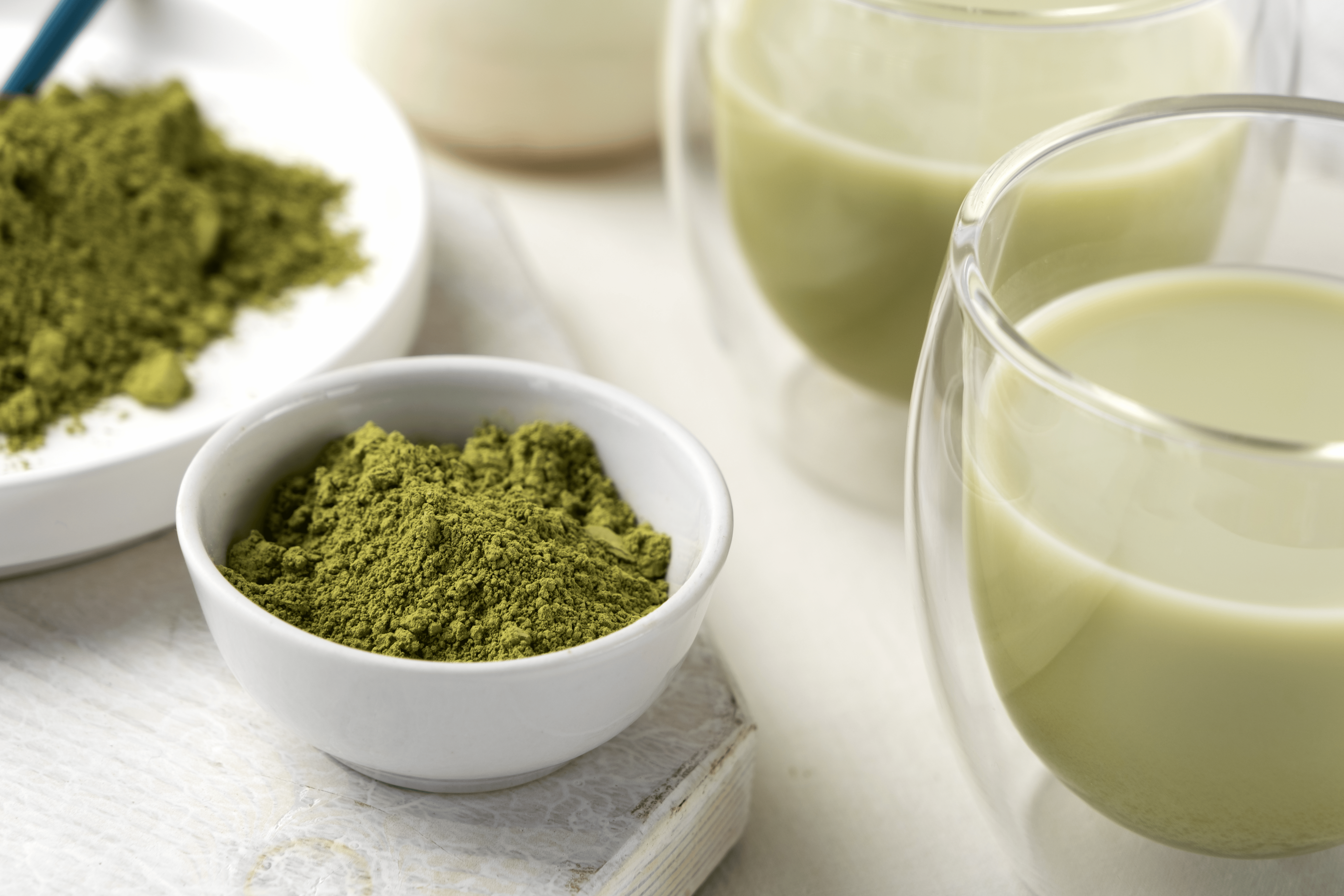Matcha Tea For Weight Loss
In the quest for effective and natural weight loss solutions, many people are turning to ancient remedies backed by modern science. Among the top contenders in this realm is Matcha Tea, a powdered green tea originating from Japan.
This vibrant green beverage not only offers a rich history and cultural significance but is also emerging as a popular ally in weight management.
In this comprehensive guide, we’ll explore how matcha tea contributes to weight loss, its unique properties, how to incorporate it into your routine, and what science says about its effectiveness.

What is Matcha Tea?
Matcha is a type of powdered green tea made from specially grown and processed Camellia sinensis leaves. Unlike regular green tea, matcha involves consuming the whole tea leaf, which is ground into a fine powder.
This means you’re ingesting a more concentrated form of the plant, resulting in higher levels of antioxidants and other beneficial compounds. The cultivation process of matcha is meticulous. About 20-30 days before harvest, the tea bushes are covered to avoid direct sunlight.
This increases chlorophyll levels, enhances amino acid content (particularly L-theanine), and gives the leaves a darker green hue. Once harvested, the leaves are steamed, dried, and stone-ground into the fine matcha powder.
Nutritional Profile of Matcha Tea
Matcha is a nutritional powerhouse. Just one serving (about 1 gram) contains:
- High levels of epigallocatechin gallate (EGCG), a type of catechin known for boosting metabolism
- Caffeine, which increases energy expenditure
- L-theanine, an amino acid that promotes relaxation without drowsiness
- A rich source of antioxidants, more than any other tea type
- Small amounts of fiber, vitamins A, C, E, and minerals such as potassium and calcium
This potent blend of nutrients makes matcha particularly effective for those looking to lose weight while supporting overall health.
How Matcha Aids in Weight Loss
1. Boosts Metabolism
The catechins in matcha, especially EGCG, have been shown to increase thermogenesis—the body’s rate of burning calories. According to several studies, drinking matcha can enhance resting metabolic rate by 8-10%, helping the body burn more calories throughout the day.
2. Enhances Fat Oxidation
Matcha helps increase the rate at which your body burns fat, particularly during exercise. A study published in the American Journal of Clinical Nutrition showed that participants who consumed green tea extract rich in catechins experienced significantly higher fat oxidation during moderate-intensity exercise.
3. Provides Sustained Energy
Thanks to its unique combination of caffeine and L-theanine, matcha delivers a calm yet alert state of mind. This prevents the energy crashes and jitters commonly associated with other caffeinated beverages. More sustained energy means more motivation and stamina for physical activity.
4. Reduces Appetite and Cravings
The balanced stimulation from caffeine and the calming effect of L-theanine may help reduce emotional eating and snacking between meals. Many users report feeling less hungry after drinking matcha, which contributes to calorie control.
5. Regulates Blood Sugar Levels
Stable blood sugar levels are crucial for weight management. Matcha’s antioxidants help regulate insulin levels, reducing sugar cravings and fat storage.
How to Use Matcha Tea for Weight Loss
1. Matcha Tea Preparation
The traditional way to consume matcha is by whisking it with hot water to make a frothy beverage. Here’s a simple way to prepare it:
- Sift 1/2 to 1 teaspoon of matcha into a bowl
- Add about 2 ounces of hot water (not boiling)
- Whisk with a bamboo whisk (chasen) until frothy
- Add more hot water (up to 6-8 ounces) based on preference
2. Matcha Smoothies
Blend matcha powder with fruits like bananas, spinach, and almond milk for a refreshing, nutrient-packed smoothie. This is especially effective as a pre- or post-workout drink.
3. Matcha Lattes
Combine matcha with steamed milk (dairy or plant-based) and a hint of honey or cinnamon for a creamy and satisfying drink that curbs appetite and provides energy.
4. Matcha Supplements
Capsules and powders are available for those who prefer convenience. Be cautious of added sugars or fillers in some commercial products.
5. Culinary Uses
Incorporate matcha into oatmeal, yogurt, protein balls, or even baked goods like muffins and pancakes for a healthy twist.
When and How Much Matcha to Consume
Moderation is key. For weight loss benefits, 1-2 servings per day (1-2 grams per serving) are generally sufficient. Consuming matcha in the morning or before workouts maximizes its fat-burning effects.
Avoid drinking matcha late in the day, especially if you are sensitive to caffeine, as it can disrupt sleep, which is counterproductive to weight loss.
Safety and Considerations
While matcha is safe for most people, some considerations include:
- Caffeine Sensitivity: Matcha contains more caffeine than regular green tea but less than coffee. If you’re sensitive to caffeine, start with a lower dose.
- Quality Matters: Opt for high-quality, organic ceremonial grade matcha to avoid contaminants like heavy metals or pesticides.
- Pregnancy and Medications: Consult with a healthcare provider if pregnant or taking medications, especially blood thinners or stimulants.
Scientific Evidence and Studies
Numerous studies support the role of green tea catechins and caffeine in weight management. Here are some notable findings:
- A 13-week study showed that participants who consumed green tea extract lost more weight and belly fat compared to a control group.
- Research published in the “Journal of Medicinal Food” confirmed that matcha increased fat oxidation during exercise.
- A meta-analysis of 11 studies concluded that green tea catechins significantly decreased body weight and maintained weight loss over time.
These studies highlight matcha’s potential as a supportive tool in a holistic weight loss plan.
Matcha vs. Other Weight Loss Teas
Compared to oolong, black, or herbal teas, matcha stands out for its high concentration of catechins and the fact that you’re consuming the whole leaf. This makes matcha more potent and beneficial for weight loss.
Furthermore, the presence of L-theanine in matcha makes it unique in promoting calm alertness without overstimulation.
Real-World Testimonials
Many individuals report positive experiences when incorporating matcha into their weight loss journeys:

- “Drinking matcha before my workouts gave me a clean energy boost and helped me burn more fat.”
- “I replaced my afternoon coffee with matcha and noticed reduced cravings and better focus.”
- “Matcha smoothies became a staple in my morning routine, helping me feel full and energized.”
Final Thoughts: Matcha as a Holistic Weight Loss Ally
Matcha tea is not a magic bullet, but it is a powerful addition to a healthy lifestyle. Its combination of fat-burning catechins, metabolism-boosting caffeine, and calming L-theanine offers a multifaceted approach to weight loss.
When combined with regular exercise, a balanced diet, and good sleep hygiene, matcha can significantly enhance your weight loss efforts.
Whether you enjoy it as a warm tea, creamy latte, or blended smoothie, matcha offers versatility, health benefits, and a delicious way to support your weight loss goals.
References
- Hursel, R., et al. (2009). Thermogenic ingredients and body weight regulation. International Journal of Obesity.
https://www.nature.com/articles/ijo2008226 - Dulloo, A. G., et al. (2000). Efficacy of green tea extract rich in catechin polyphenols and caffeine in increasing 24-h energy expenditure and fat oxidation. American Journal of Clinical Nutrition.
https://academic.oup.com/ajcn/article/70/6/1040/4729182 - Nagao, T., et al. (2007). A green tea extract high in catechins reduces body fat and cardiovascular risks in humans. Obesity.
https://onlinelibrary.wiley.com/doi/abs/10.1038/oby.2007.176 - Thielecke, F., & Boschmann, M. (2009). The potential role of green tea catechins in the prevention of the metabolic syndrome – a review. Phytochemistry.
https://pubmed.ncbi.nlm.nih.gov/19234584 - Henning, S. M., et al. (2004). Bioavailability and antioxidant activity of tea flavanols after consumption of green tea, black tea, or a green tea extract supplement. American Journal of Clinical Nutrition.
https://academic.oup.com/ajcn/article/80/6/1558/4690483